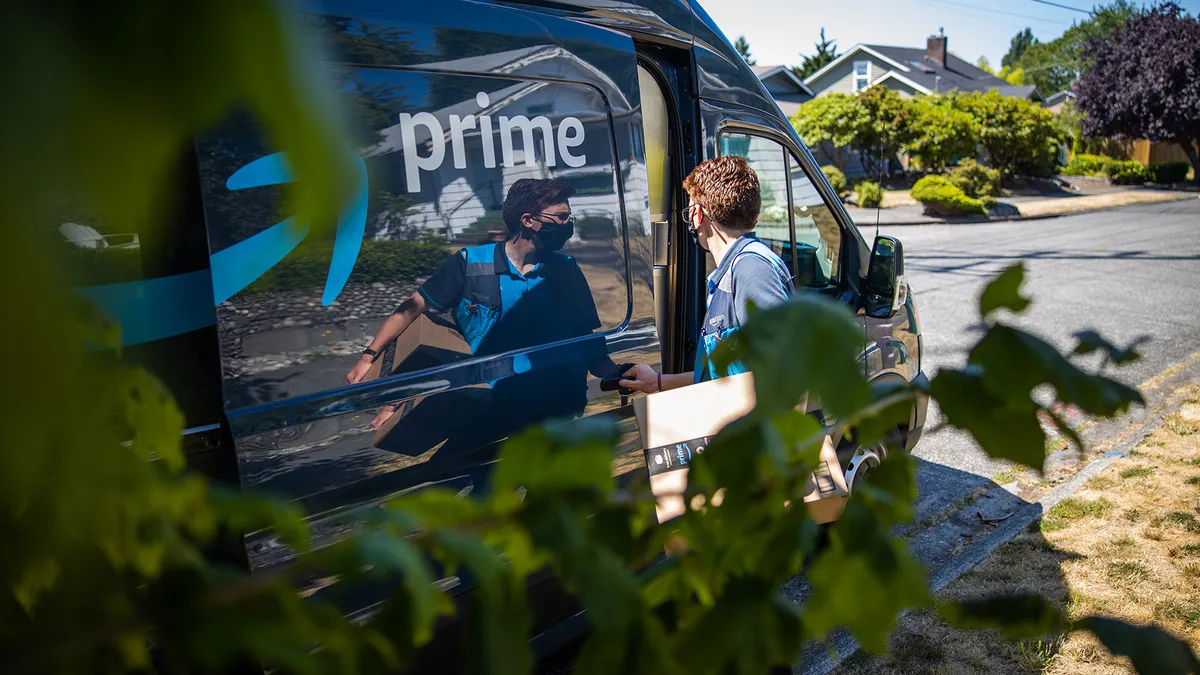Dive Brief:
- Amazon is asking a judge to dismiss the Federal Trade Commission’s antitrust case against the company. In arguing the case should be thrown out, the e-commerce giant said in a Friday court filing that the company’s conduct falls within the scope of “common retail practices that presumptively benefit consumers.”
- Amazon also disputes the FTC’s claim that it’s a monopoly. Instead, the company said, the development of Amazon’s third-party marketplace business model, fulfillment services and membership-based Prime were all created in response to retail competition with rivals like Walmart, Best Buy and Home Depot.
- The FTC’s suit also alleges that Amazon uses its Prime badge to push sellers to the company’s fulfillment services. Amazon denied that allegation and said making seller recommendations is procompetitive and lawful.
Dive Insight:
The FTC and a coalition of 17 state attorneys general sued Amazon in September. They alleged that the e-commerce giant engaged in “punitive and coercive tactics” to maintain various retail monopolies. The alleged monopolies include actions and policies that affect marketplace sellers responsible for 60% of unit sales on Amazon.
At the center of Amazon’s request to dismiss the case is the company’s position that the business practices called into question as anticompetitive instead represent “the very essence of competition.” The company filed its 31-page response in U.S. District Court in Seattle.
Amazon said, “antitrust law does not seek to punish economic behavior that benefits consumers.” Additionally, the alleged possession of monopoly power isn’t unlawful unless an element of anticompetitive conduct accompanies it. Further, matching rival retailers’ discounts and inducing marketplace sellers to feature low-priced offers are within the scope of fair business practices, Amazon said.
“When sellers respond by lowering their prices — as the policies contemplate — that effect is a pro-consumer benefit, and the complaint does not contend otherwise,” Amazon said. “Instead, the complaint ignores this price-reducing effect and alleges only that a handful of Amazon’s more than 560,000 third-party sellers purportedly responded to these policies by increasing their prices on, or removing products from, other sales channels.”
Amazon’s rebuttal also says the FTC has no standing to bring a claim regarding its now-discontinued “Project Nessie.” The experiment automated price matching to the second-lowest competitor for a limited selection of products. Amazon said the algorithm-based, experimental pricing program was discontinued in 2019 and the company has no plans to resume it. The FTC said Amazon used Nessie to raise prices on some products. The FTC claimed Nessie was used to manipulate prices higher, resulting in an additional $1 billion in excess profits for Amazon.
Amazon also asks for the dismissal of the state-level claims, saying that they duplicate the FTC’s anticompetitive claims under federal law and do not allege violations of state consumer protection statutes.
The company faces a separate FTC lawsuit that alleged Amazon tricked consumers into joining or keeping their Prime memberships. Amazon has also asked the court to dismiss that suit, saying its business practices in that matter comply with the law.
















